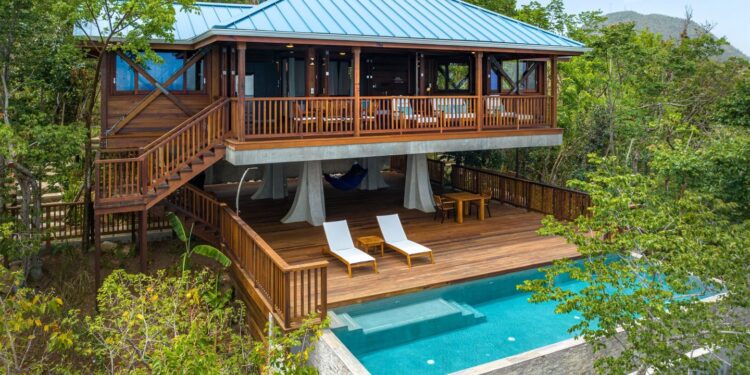Nestled between the Caribbean Sea and a rainforest, Secret Bay is a six-star luxury hotel routinely named the best in the region. For around $1,000 to $5,000 per night, guests enjoy private plunge pools, access to pristine beaches, and soaks in natural thermal springs in the resort’s ultra-private and lush environment, with personal concierges to attend to their every need.
But it’s not solely a tourist destination. Starting at $1.4 million, interested investors can purchase the cliffside vacation homes, guaranteeing 10 to 24 weeks each year to enjoy the amenities. Also included in the price tag: citizenship in Dominica, a small mountainous nation near Barbados.
Secret Bay’s program is one of many that exist in the world of residency and citizenship by investment, or CBI: cash-for-passport initiatives that enable investors to obtain residency or citizenship without jumping through the usual hoops or enduring the typical waiting periods. While some countries require substantial investments in businesses or government ventures, others allow interested parties to simply buy or invest in certain government-approved real estate holdings to secure a second (or third) passport.
How it typically works: Whether in Dominica or Grenada or Portugal, investors find a real estate fund or project to invest in, or even a private residence to purchase for their own use, that meets a qualifying level of capital. Doing so can fast-track the investor on a path to citizenship in a country that might not otherwise allow it. Then investors go through a due diligence process that varies country to country before they receive citizenship. The minimum investment varies by country as well as family size.
In Dominica, the source of the investor’s wealth is verified through the due diligence process to ensure that he or she is a “person of good standing,” says Gregor Nassief, founder of Secret Bay. The qualifying investment threshold for citizenship for an individual in the country is $200,000, and Secret Bay’s program is government-approved.
Secret Bay has offered villas that qualify under the CBI program since 2019. Investors can purchase whole villas starting at $1.4 million, and multi-villa estates starting at $4.5 million.
But for those looking for a smaller down payment, fractional ownership of vacation properties is also a common type of citizenship-by-investment scheme. Again, the exact structure will vary by country and property, but at Secret Bay, investors can purchase an ownership share in the LLCs that hold the titles to the villas. In addition to citizenship, the investment entitles the buyer to two to 10 weeks of stay per year, depending on how many shares she purchases, and the potential for a quarterly return-on-investment payout. Share prices range from $216,000 to $1 million.
Buying into Secret Bay also serves as an investment. The return comes from the several weeks out of each year that each villa is reserved as a vacation rental; Secret Bay is, after all, a well-regarded luxury hotel first and foremost. Rental income, after expenses, is shared with the villa owners on a quarterly basis (even those who own a villa outright cannot live in it full-time). It is not guaranteed, but Nassief says that it has paid one out each quarter since inception, except for the pandemic-era second quarter of 2020.
This fractional ownership model for CBI is popular across the Caribbean and is especially common at hotels (though investors can also put money into other types of infrastructure, like bridges and marinas). In addition to Dominica, Antigua and Barbuda, Grenada, St. Kitts and Nevis, and St. Lucia also offer their own version, and brand-name hotel chains familiar to Americans like Hilton and Marriott participate. Along with the upfront investing cost, some programs charge annual fees, and there are typically holding periods for citizenship investors (in Dominica, investors cannot sell for five years).

Most of Secret Bay’s investors are interested in securing citizenship, says Nassief, and when Secret Bay began selling villas in 2019, many purchasers hailed from the Middle East or Eastern Europe. They were interested in securing a “plan B” passport because of the instability or political regime in their home countries. While passports from some countries are highly restrictive, a Dominica passport guarantees visa-free travel to more than 140 countries.
Now, though, many more investors are from North America, he says. And though the investors wouldn’t turn down the ROI, these buyers are primarily interested in a vacation property that also grants them second citizenship for ease of travel, he says. Restrictions put in place during COVID-19 were particularly irksome to these wealthy investors, he says, who are not accustomed to being told no. By gaining citizenship, they are also trying to ensure they won’t be kept out again, among other reasons.
“The U.S. passport is very strong, so they’re not interested in giving up their citizenship,” says Nassief. “For them, it’s all about a plan B. It’s those on the left who fear an extreme [election] outcome on the right, or those on the right, who fear an extreme outcome on the left, and they’re looking for an insurance policy, so to speak.”
Secret Bay wasn’t created with the intent of being a vehicle for second citizenship; it was built as a luxury resort. The investment program, though, has helped the resort expand, says Nassief, and was more attractive to him than bank financing. In 2019, there were six villas; come next year, Secret Bay will have 28. In that time, it’s also added a restaurant, spa, wellness pavilion, and kombucha brewery, among other amenities, for guests and investors alike.
It’s popular enough that Secret Bay has added more villas over the past few years, and launched the fractional share program. As of the first quarter of 2024, it has 188 investors.
“It’s just a really interesting crossroads,” he says. “You’re investing in an asset that has a financial value, it has a lifestyle value, and then it also has a citizenship benefit.”







